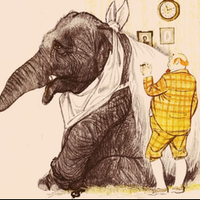VI
6
<VI> en el contexto de <VI>.
VI
VI
VI
VI
VI
六
VI
VI
VI
VI
VI
VI
六
Ночью слона ведут в гости к больной девочке.
at night|the elephant|are leading||to visit (with 'ведут в')|to|to the sick|to the girl
Nachts wird ein Elefant mitgenommen, um ein krankes Mädchen zu besuchen.
At night, the elephant is taken to visit a sick girl.
La nuit, l'éléphant est emmené rendre visite à une fille malade.
Di notte, un elefante viene portato a visitare una ragazza malata.
À noite, o elefante é levado para visitar uma menina doente.
Он шагает по самой середине улицы и качает головой.
he|is walking|in|right in (with 'по ... середине')|in the middle|the street|and|is shaking|his head
Er tritt mitten auf die Straße und schüttelt den Kopf.
He walks down the middle of the street and shakes his head.
Il marche au milieu de la rue et secoue la tête.
Ele caminha pelo meio da rua e balança a cabeça.
Вокруг него, несмотря на поздний час, большая толпа.
around|around him|despite|despite (with 'несмотря')|late|the hour|a large|a crowd
Trotz der späten Stunde ist eine große Menschenmenge um ihn versammelt.
Around him, despite the late hour, a large crowd.
Autour de lui, malgré l'heure tardive, une foule nombreuse.
C'è una grande folla intorno a lui, nonostante l'ora tarda.
Ao seu redor, apesar da hora tardia, uma grande multidão.
Но слон не обращает внимания на людей.
but|the elephant|not|pays|attention|on|people
Aber der Elefant schenkt den Menschen keine Beachtung.
But the elephant pays no attention to people.
Mais l'éléphant ne fait pas attention aux gens.
しかし、象は人々に注意を払いません。
Mas o elefante não presta atenção nas pessoas.
Подходят к дому.
approach|to|to the house
Wir nähern uns dem Haus.
Come up to the house.
Ils viennent à la maison.
家に来なさい。
Eles vêm para a casa.
Перед лестницей слон останавливается и упрямится.
in front of|at the stairs|the elephant|stops|and|refuses
Vor der Treppe bleibt der Elefant stehen und ist störrisch.
In front of the stairs, the elephant stops and becomes stubborn.
Devant l'escalier, l'éléphant s'arrête et s'obstine.
階段の前で象は立ち止まり頑固になります。
Na frente da escada, o elefante para e teimosamente.
— Надо дать ему что-то вкусное…— говорит немец.
have to|to give|to him|||tasty|says|the German
- Wir sollten ihm etwas Leckeres geben...", sagt der Deutsche.
- We must give him something tasty ... - says the German.
"Il faut lui donner quelque chose de savoureux…" dit l'Allemand.
- Dovremmo dargli qualcosa di gustoso..." dice il tedesco.
Надин отец бежит в соседнюю булочную и покупает большой круглый фисташковый торт.
|father|runs||to the neighboring|bakery|and|buys|a big|round|pistachio|a cake
Nadines Vater läuft zur benachbarten Bäckerei und kauft einen großen runden Pistazienkuchen.
Nadine's father runs to a nearby bakery and buys a large round pistachio cake.
Le père de Nadine court dans une boulangerie voisine et achète un gros gâteau rond à la pistache.
Il padre di Nadine corre alla pasticceria vicina e compra una grande torta rotonda al pistacchio.
ナディーンの父親は近くのパン屋に駆け寄り、大きな丸いピスタチオケーキを買います。
O pai de Nadine corre para uma padaria próxima e compra um grande bolo redondo de pistache.
Хозяин даёт слону один кусок.
the owner|gives|to the elephant|one|one piece
Der Meister gibt dem Elefanten ein Stück.
The owner gives the elephant one piece.
Le propriétaire donne une pièce à l'éléphant.
Торт приходится по вкусу Томми, и он протягивает хобот за вторым куском.
the cake|is to (with 'торт')|to|to the taste|to Tommy|and|he|reaches|trunk|for|the second|piece
Der Kuchen schmeckt Tommy, und er greift in seinen Kofferraum, um sich ein zweites Stück zu holen.
Tommy likes the cake, and he holds out his trunk for a second piece.
Le gâteau est au goût de Tommy, et il tend sa malle pour un deuxième morceau.
トミーはケーキが好きで、2番目のピースのためにトランクを差し出します。
O bolo é do gosto de Tommy, e ele estende seu baú para um segundo pedaço.
Хозяин поднимается вверх по ступенькам.
the owner|is going up|up|up|the steps
Der Herr geht die Treppe hinauf.
The owner goes up the steps.
Le propriétaire monte les marches.
O proprietário sobe os degraus.
Слон идёт за ним и получает другой кусок.
the elephant|is walking|behind|him|and|receives|another|another piece
The elephant follows him and gets another piece.
L'éléphant le suit et récupère un autre morceau.
Таким образом его приводят в столовую.
in this way (with 'образом')|in this way|him|take (to the dining hall)|to|to the dining hall
So wird er in den Speisesaal gebracht.
Thus he is brought into the dining room.
Ainsi, il est amené à la salle à manger.
Così viene portato in sala da pranzo.
Assim, ele é levado para a sala de jantar.
Из столовой вынесли всю мебель, на полу лежит солома и еда для слона — морковь и капуста.
out|the dining room|carried out|all|furniture|on|on|is lying|straw|and|food|for|for the elephant|carrot||cabbage
Alle Möbel sind aus dem Esszimmer entfernt worden, auf dem Boden liegt Stroh und das Futter für den Elefanten - Karotten und Kohl.
All the furniture was taken out of the dining room, straw and food for the elephant - carrots and cabbage - lay on the floor.
Tous les meubles ont été retirés de la salle à manger, il y a de la paille sur le sol et de la nourriture pour l'éléphant - carottes et chou.
Tutti i mobili sono stati tolti dalla sala da pranzo, c'è paglia sul pavimento e cibo per gli elefanti: carote e cavoli.
Todos os móveis foram retirados da sala de jantar, há palha no chão e comida para o elefante - cenoura e repolho.
Хозяин располагается рядом, на диване.
the host|is situated|next to|on|on the sofa
Der Gastgeber lässt sich neben mir auf dem Sofa nieder.
The owner is sitting next to him on the couch.
Le propriétaire est assis à côté de moi sur le canapé.
L'ospite si sistema accanto a me, sul divano.
所有者は彼の隣のソファにいます。
O dono se senta ao meu lado no sofá.
Тушат свет, и все ложатся спать.
turn off|the light|and|everyone|go to bed|go to sleep
Die Lichter gehen aus und alle gehen ins Bett.
They put out the lights and everyone goes to bed.
Les lumières sont éteintes et tout le monde va se coucher.
Le luci si spengono e tutti vanno a letto.
As luzes se apagam e todos vão para a cama.

